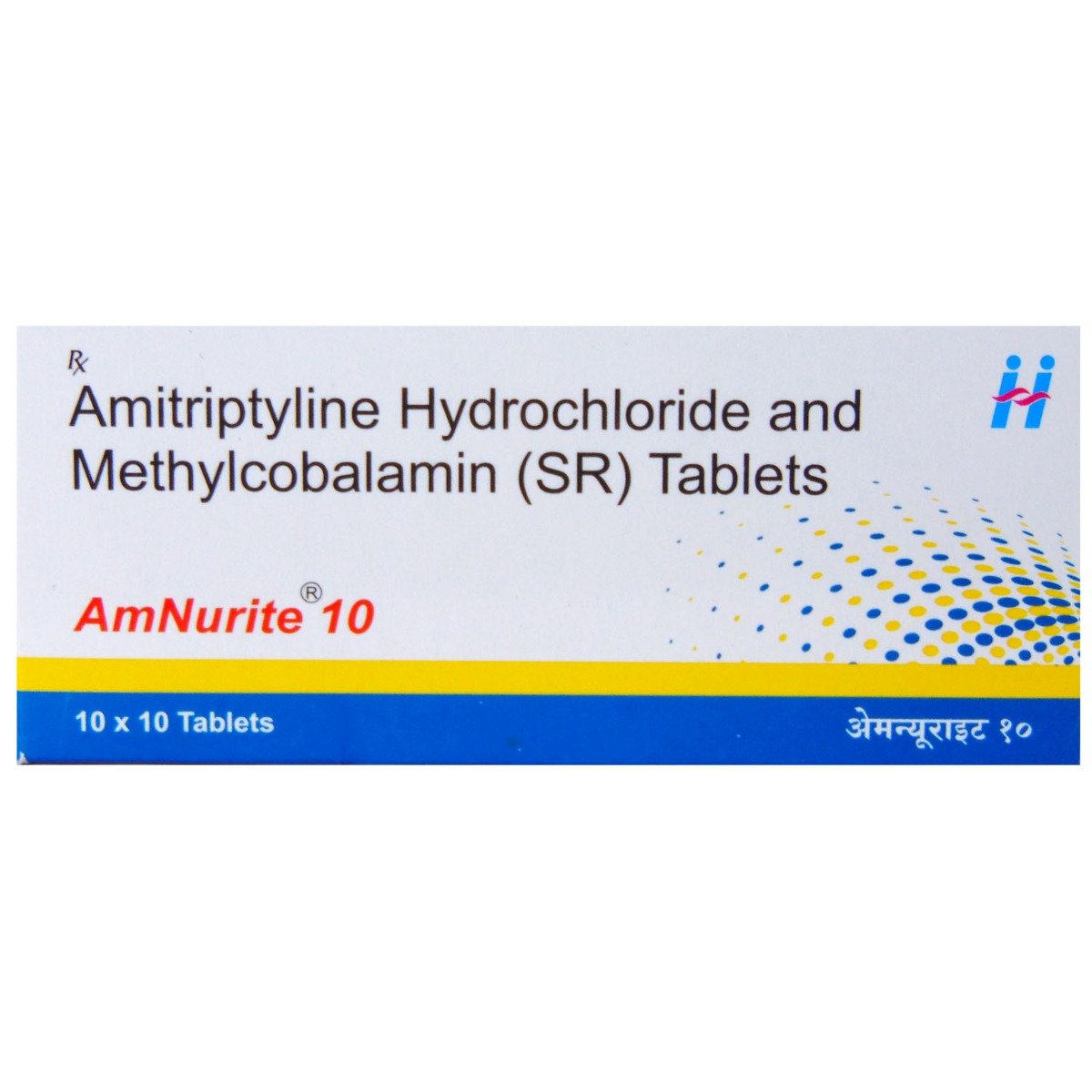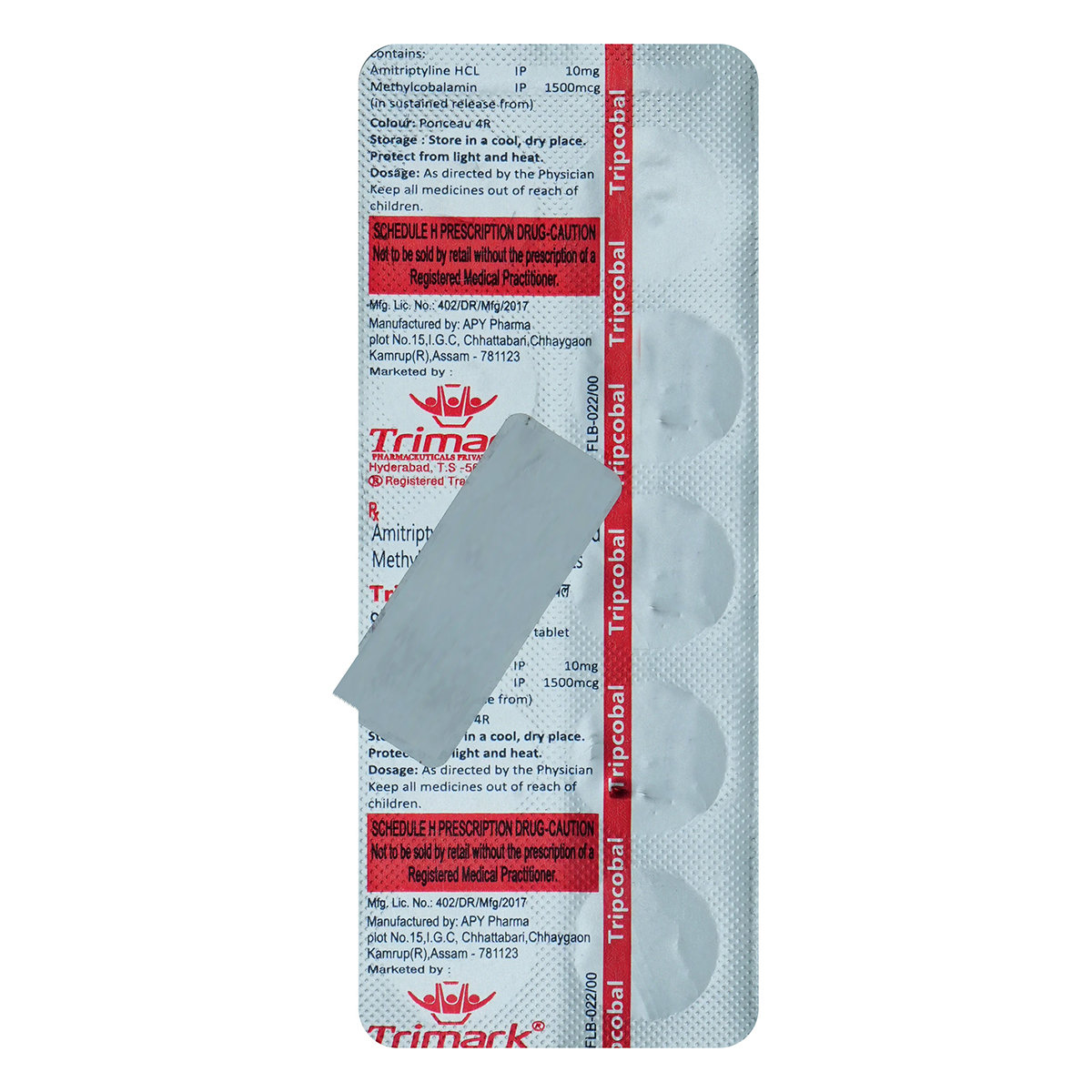Amitriptyline+mecobalamin
About Amitriptyline+mecobalamin
Mecobalamin+amitriptyline belongs to a group of medications known as 'anticonvulsants' used to manage neuropathic pain due to damaged nerves. Neuropathic pain is a chronic progressive nerve disease that causes nerve pain due to nerve damage or a malfunctioning nervous system. The pain could be intermittent or continuous, with a prickling, stabbing, tingling, or burning sensation.
Mecobalamin+amitriptyline is a suspended-release tablet that combines two drugs: Mecobalamin (vitamin B12) and Amitriptyline (anticonvulsant). Mecobalamin (also known as methylcobalamin) is a form of Vitamin B12 required by the brain and nerves for producing red blood cells. Amitriptyline works by changing how nerves send messages to your brain. Together, Mecobalamin+amitriptyline helps to treat neuropathic pain (pain due to nerve damage).
Take Mecobalamin+amitriptyline as prescribed by your doctor. Depending on your medical condition, you are advised to take Mecobalamin+amitriptyline for as long as your doctor has prescribed it for you. In some cases, you may experience common side effects such as nausea, vomiting, stomach pain, diarrhoea, loss of appetite, heartburn, dry mouth, dizziness, sleepiness, and uncoordinated body movements. Most of these side effects do not require medical attention and will resolve gradually over time. However, you are advised to talk to your doctor if you experience these side effects persistently.
Do not take Mecobalamin+amitriptyline if you are pregnant or breastfeeding unless prescribed by the doctor. Mecobalamin+amitriptyline causes drowsiness and dizziness, so drive only if you are alert. Mecobalamin+amitriptyline should not be given to children as safety and effectiveness have not been established. Avoid consuming alcohol with Mecobalamin+amitriptyline as it could lead to increased dizziness and sleepiness. Keep your doctor informed about your health condition and medicines to rule out any side effects. Let your doctor know if you have a history of heart disease, severe kidney disease, disorders of the stomach or gut/bowel, and diabetes before using the Mecobalamin+amitriptyline.
Uses of Amitriptyline+mecobalamin
Medicinal Benefits
Mecobalamin+amitriptyline is a combination of two drugs: Methylcobalamin and Amitriptyline. Methylcobalamin is used to restore vitamin B12 in the body to treat damaged nerve conditions due to diabetes or other traumatic situations. It also has a neuroprotective activity that helps the nerve cells to function properly and treat neuropathic pain. On the other side, Amitriptyline prevents neuropathic pain (pain due to damaged nerves), fibromyalgia (musculoskeletal pain), and epilepsy (fits). It works by calming the damaged or overactive nerves in your body that may cause pain or seizures, thereby decreasing the number of pain signals sent out by damaged nerves in the body. Overall it reduces the pain which has been damaged or irritated due to conditions like chronic conditions, diabetes, trauma or epilepsy. Together, Mecobalamin+amitriptyline helps to treat neuropathic pain.
Directions for Use
Storage
Side Effects of Amitriptyline+mecobalamin
- Nausea
- Vomiting
- Stomach pain
- Diarrhoea
- Heartburn
- Dryness in mouth
- Dizziness
- Blurred vision
Drug Warnings
Do not take Mecobalamin+amitriptyline if you are allergic to any of its contents, if you recently had a heart attack or heart problems, are taking other antidepressants like isocarboxazid, phenelzine, selegiline, tranylcypromine or have taken them in the last 14 days, have severe liver disease or if you have taken moclobemide (used to treat depression and social anxiety). Inform your doctor before taking Mecobalamin+amitriptyline if you have heart rhythm problems or hypotension. Consult your doctor immediately if you have suicidal thoughts like killing or harming yourself. Do not take Mecobalamin+amitriptyline if you are pregnant or breastfeeding unless prescribed. Mecobalamin+amitriptyline causes drowsiness and dizziness, do not drive unless you are alert. Mecobalamin+amitriptyline can be given to children above six years if prescribed by the doctor for treating bedwetting. Mecobalamin+amitriptyline should not be given to children for treating depression or neuropathic pain. Avoid consuming alcohol with Mecobalamin+amitriptyline as it could lead to increased drowsiness and dizziness. Rise slowly from sitting or lying position as Mecobalamin+amitriptyline causes orthostatic hypotension (sudden lowering in blood pressure leading to dizziness on standing).
Drug Interactions
Drug-Drug Interactions: Mecobalamin+amitriptyline may interact with painkillers (tramadol, trazodone, hydrocodone, oxycodone, acetaminophen), an antidepressant (bupropion, duloxetine, fluoxetine, sertraline), antihistamine (diphenhydramine, cetirizine), sedatives (zolpidem), muscle relaxant (cyclobenzaprine), anti-convulsant (gabapentin, lamotrigine, escitalopram, pregabalin, topiramate), anti-thyroid (levothyroxine), and anti-anxiety (alprazolam).
Drug-Food Interactions: Avoid alcohol consumption while taking Mecobalamin+amitriptyline as it might cause increased dizziness and sleepiness.
Drug-Disease Interactions: Mecobalamin+amitriptyline may interact with disease conditions such as heart problems, anticholinergic effects, depression, seizure disorders, bone marrow suppression, diabetes, schizophrenia, bipolar disorder, acute alcohol intoxication, glaucoma, thyroid problems, pheochromocytoma, neutropenia, kidney and liver problems.
Drug-Drug Interactions Checker List:
Safety Advice

Alcohol
unsafeAvoid consumption of alcohol while taking Mecobalamin+amitriptyline as it may increase drowsiness and sleepiness.

Pregnancy
cautionPlease consult your doctor if you have any concerns regarding this; your doctor will prescribe only if the benefits outweigh the risks.

Breast Feeding
cautionConsult your doctor before taking Mecobalamin+amitriptyline; your doctor will decide whether Mecobalamin+amitriptyline can be taken by breastfeeding mothers or not.

Driving
unsafeMecobalamin+amitriptyline causes drowsiness, sleepiness, and blurred vision. Do not drive or operate machinery unless you are alert.

Liver
cautionDose adjustment may be needed in patients with liver impairment. Please consult your doctor if you have a liver impairment or any concerns regarding this.

Kidney
cautionDose adjustment may be needed in patients with kidney impairment. Please consult your doctor if you have kidney impairment or any concerns regarding this.

Children
cautionMecobalamin+amitriptyline should not be given to children as the safety and efficacy have not been established.
Habit Forming
Diet & Lifestyle Advise
- Include food rich in vitamins B and D in your diet.
- Include cayenne pepper in your diet to help lower neuropathic pain.
- Exercising regularly helps in improving overall health and combating pain.
- Rest well, and get plenty of sleep.
- Try taking a warm bath, as it can be soothing.
- Avoid smoking and alcohol consumption.
- Meditation and yoga can help lower stress, decrease pain sensitivity, and improves coping skills.
- Acupuncture can be helpful by stimulating pressure points.
- Using essential oils for massages can help increase circulation.
Special Advise
- Mecobalamin+amitriptyline can make you feel dizzy or drowsy, try to get up slowly while rising from a sitting or lying position.
- Mecobalamin+amitriptyline can cause dry mouth, so in that case, you can drink water or fluids, suck hard candy or ice, chew (sugarless) gum, or use a saliva substitute.
Patients Concern
Disease/Condition Glossary
Neuropathic pain: Neuropathic pain is caused due to damage to sensory nerves. It is caused by chronic progressive nerve disease or due to infection or injury. The pain could be intermittent or continuous, which is felt as a prickling, stabbing, tingling, or burning sensation. A feeling of numbness and loss of sensations is also common with neuropathic pain. Usually, the body sends the pain signals when there is an injury, but with neuropathic pain, the pain is not triggered by an injury; the body unpromptedly sends the pain signals. Symptoms include spontaneous, untriggered pain, unpleasant feeling, shooting, burning or stabbing pain, difficulty resting or sleeping and evoked pain (pain caused by events usually not painful).
FAQs
Mecobalamin+amitriptyline is a combination of two drugs: Amitriptyline (antiepileptic) and Methylcobalamin (vitamin B12). Amitriptyline improves nerve signal conduction of damaged nerves. Methylcobalamin is a form of Vitamin B12 that helps in the regeneration of damaged nerves and helps produce the myelin sheath (outer protecting layer of nerves). Thus, Mecobalamin+amitriptyline promotes the healing of damaged nerves and improves nerve conduction in diabetes or traumatic conditions.
Dry mouth could be a side-effect of Mecobalamin+amitriptyline. Limiting caffeine intake, avoiding smoking and mouthwashes containing alcohol, drinking water regularly, and chewing sugar-free gum/candy might stimulate saliva and prevent drying of the mouth.
Mecobalamin+amitriptyline may cause weight gain due to an increase in appetite. Maintain a healthy weight by regular exercise and following a proper diet.
Mecobalamin+amitriptyline is used to treat neuropathic pain due to diabetic neuropathy. Diabetic neuropathy is a condition in which nerve damage occurs due to high blood glucose levels. It mostly damages the nerves in the legs and feet.
Do not discontinue Mecobalamin+amitriptyline without consulting your doctor as it could lead to withdrawal symptoms. To treat your condition effectually, continue taking Mecobalamin+amitriptyline for as long as prescribed. Do not be reluctant to speak with your doctor if you feel any difficulty while taking Mecobalamin+amitriptyline; your doctor will reduce the dose gradually.




